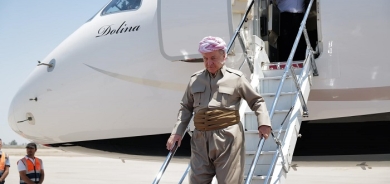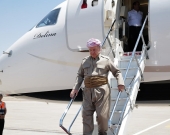Iraqi Parliament Passes Three-Year Federal Budget Amidst Political Wrangling

The Iraqi parliament has successfully passed all articles of the three-year federal budget after a series of intense deliberations and negotiations. The process was marked by political wrangling, particularly between Kurdish parties, leading to several disputes and disagreements.
Late on Sunday night, the parliament resumed its session to vote on the remaining articles of the federal budget bill. Contentious points continued to cause conflicts among Kurdish and Shiite Members of Parliament (MPs), as well as within the Kurdish parties themselves, primarily the Kurdistan Democratic Party (KDP) and the Patriotic Union of Kurdistan (PUK).
In a statement, the parliament announced that it had voted in favor of passing the draft federal budget law for the Republic of Iraq for the years 2023, 2024, and 2025.
The approved budget amounts to a record $152 billion in spending, with 12.6 percent allocated to the Kurdistan Region. However, concerns have been raised about potential instability if oil prices fall below the threshold of $70 per barrel specified in the bill.
One of the most disputed articles in the budget was Article 14, which addresses the management of the Kurdistan Region's oil income. Paragraph seven of Article 14 specifically triggered commotion between Kurdish and Shiite MPs. It stipulates that in the event of a dispute between the Kurdistan Region and the Iraqi government, a joint committee would convene within 30 days to find a solution. Shiite parliamentarians sought to amend this paragraph to cut the Kurdistan Region's budget share if a solution was not reached within 15 days.
Fuad Hussein, head of the KDP delegation and Iraqi Foreign Minister, announced on Saturday that an agreement had been reached regarding paragraph seven, although specific details were not disclosed.
Although the Shiite blocs hold the majority of seats in the parliament, Kurdish representation is divided among different parties, with approximately 60 seats in total.
Shakhawan Abdullah, the second deputy speaker of the Iraqi parliament and a member of the KDP, criticized the Shiite blocs for attempting to amend the article in a way that would suspend the Kurdistan Regional Government's (KRG) share within 15 days. Abdullah argued that this provision could be misused to cut the budget allocation even over minor issues, describing Article 14 as "the soul of the budget."
Another point of contention arose between the KDP and PUK over an additional eighth paragraph to Article 14. The paragraph emphasizes the importance of prioritizing financial merits, salaries, and wages of public servants in the Kurdistan Region. It also outlines measures that would be taken by the Iraqi prime minister if the KRG fails to comply. The KDP objected to this paragraph, claiming it would weaken the Kurdistan Region, while the PUK argued that it ensures fair distribution of funds among all provinces and prevents any withholding of funds by the KDP.
Further disagreements emerged over a provision in Article 14 that required the KRG to repay ten percent of the money it had previously cut from civil servants' salaries as part of austerity measures. The KDP opposed this provision, and as a result, it was removed from Article 14. The KRG argued that its share was insufficient to repay the owed amount and requested an increase.
MP Soran Omar reported that the Shiite blocs inside the Iraqi parliament acted aggressively against the Region's proposals to allocate extra revenue from oil sales for the repayment of salary cuts. He criticized the behavior of the Shiite blocs, cautioning the Kurdish parties about their alliances with them.
KRG Prime Minister Masrour Barzani condemned those who attempted to compromise the Region's constitutional rights, referring to them as "traitors." He expressed confidence in the strength of the Kurdistan Region and vowed not to compromise on its constitutional rights.
In addition to passing the federal budget, the Iraqi parliament also approved Article 13, which covers the coordination of oil exports from the Kurdistan Region with the Iraqi government and the transfer of non-oil revenues to Baghdad. A deal had been signed between Baghdad and Erbil to resume the exports of the Kurdistan Region's oil following a court ruling that led to the temporary suspension of oil flow to global markets. However, oil exports have yet to resume, despite the agreement.
The passing of the federal budget signifies an important step forward for Iraq, but challenges and divisions among different political factions continue to pose obstacles to achieving a cohesive and stable financial plan for the country.












